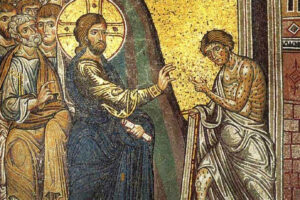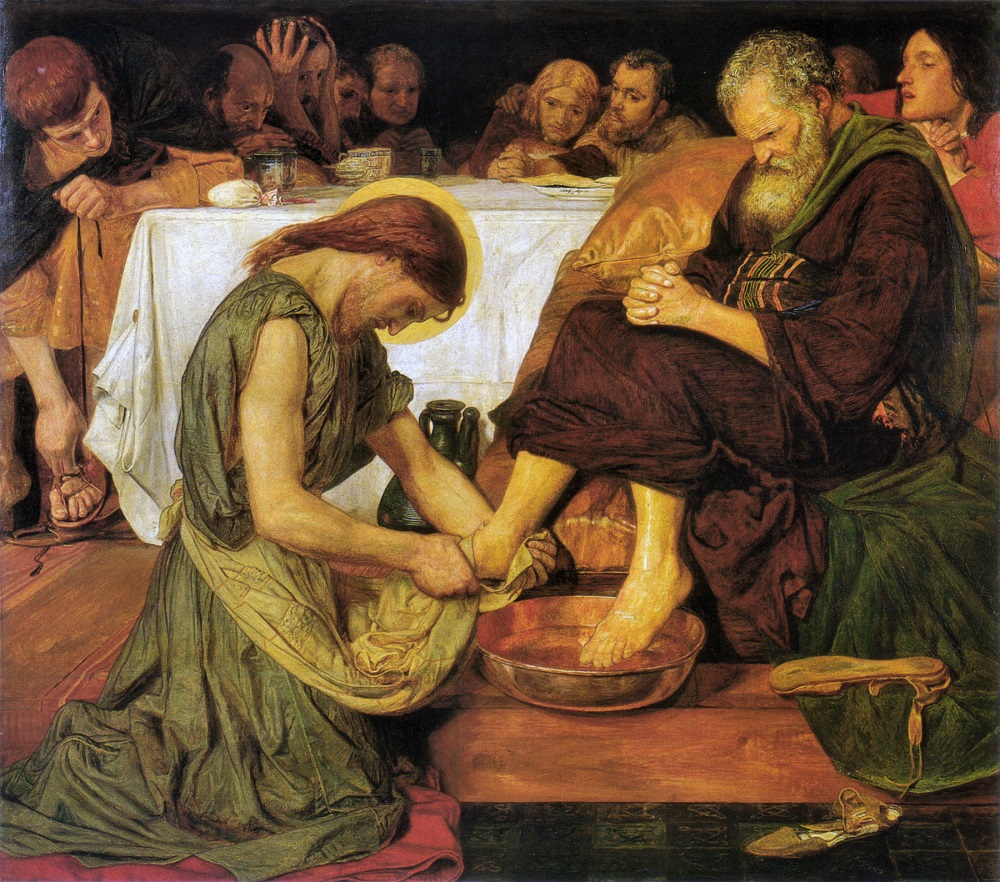Last edited on 28/Mar/2021
The Bible’s Answer
Introduction
Have this mind among yourselves, which is yours in Christ Jesus, [6] who, though he was in the form of God, did not count equality with God a thing to be grasped, [7] but made himself nothing, taking the form of a servant, being born in the likeness of men. [8] And being found in human form, he humbled himself by becoming obedient to the point of death, even death on a cross. (Philippians 2:5–8, ESVUK)
The above Bible passage is a fine example of the deity of Jesus Christ. Being in “the form of God” means that Jesus is God himself, as we know from the context that being in “human form” made him truly human (verse 8). In addition, the fact that Jesus “did not count equality with God a thing to be grasped” while on the earth (or as the NIV puts it, “did not consider equality with God something to be used to his own advantage”) shows that Jesus is fully equal with God and that he didn’t use this to make life easier for himself during his earthly ministry.
There is nothing difficult about those verses. The difficulty comes, however, with verse 7 where it says that Jesus “made himself nothing”, which literally means that he “emptied himself”.¹ What exactly did Jesus empty himself of, if anything? And is this the right way to understand it?
Jesus Did Not Become Less Divine
Let’s start with what the verse is not saying. The verse isn’t saying that when Jesus took the form of a servant and human that he emptied himself of his divine powers, attributes, authority, or equality with the Father. That is a heresy. Jesus did not become less God in the incarnation. The text simply says that he “emptied himself, taking the form of a servant”, but it doesn’t specify what Jesus emptied himself of.
The Emptying Is Connected to Jesus’ Incarnation
But here’s what we do know from the text: the action of Jesus “emptying” himself is connected to the incarnation, i.e., him taking on flesh. We also know from verse 8 that it was a humbling event. Indeed, being in the form of God, sitting at God’s right hand as his equal in heaven, Jesus had all the honour, glory, and privileges of God himself. However, when Jesus stepped down from his throne as King in Heaven to take on flesh, he chose not to cling to these benefits (verse 6) and chose instead to be a servant, being born in the same way any other human is born (verse 7), except Christ was born in a lowly manger. Jesus willingly humbled himself by being perfectly obedient to the will of God, enduring much suffering along with all the weaknesses and limitations that came with being human, and fully followed his Father’s plan of salvation even though he knew that it would one day lead to the cross (verse 8).
Bible Commentary Observations
The Moody Bible Commentary makes the following observation on this passage:
When emptying Himself the Son did not cease to be God nor did He give up His deity. He did not temporarily surrender the independent exercise of His divine attributes (as if, with the Trinity, such a thing could happen). Indeed the verse does not say He gave up anything. Instead, One so glorious and powerful did the unexpected: He took on the form of a bond-servant (v. 7b). That is, emptying happens by taking on a new role. He was able to become a bond-servant because of his incarnation (in the likeness of men, v. 7c). He further humbled Himself to the point of a most horrible death—death on a cross (v. 8).²
Indeed, the verse does not say that Jesus temporarily gave up the independent use of his divine attributes, or that he even gave up anything, but that his emptying himself was none other than the act of him taking on the role of a servant, through the incarnation. In addition, the Zondervan King James Version Commentary of the New Testament says:
2:7. Made himself of no reputation. He did this not by giving up deity but by laying aside His glory (see John 17:5) and submitting to the humiliation of becoming man (see 2 Cor. 8:9). Jesus is truly God and truly man. Another view is that He emptied Himself, not of deity itself but of its prerogatives—the high position and glory of deity. In either case, the words “made himself of no reputation” should be explained by addition and not subtraction: “He made himself of no reputation by taking the form of a servant and being made in the likeness of men.” The form of a servant emphasizes the full reality of His servant identity (see Matt. 20:28). As a servant, He was always submissive to the will of the Father.³
As this commentary observes, Christ emptying himself could have involved: 1. setting aside his glory and submitting to the humiliation of taking on human flesh, or 2. setting aside the rights and privileges of deity (the high position), not deity itself. Still, it also maintains that either way it ultimately involved Jesus taking on the new role of a servant through the incarnation.
Jesus’ Emptying: Becoming a True Human and Servant
From this evidence, we see that the act of Jesus having emptied himself, or as the ESV puts it, having “made himself nothing”, did not involve Jesus losing any divine power, attribute, or authority that he has as God the Son, but rather that it involved the humiliation of temporarily setting aside his divine privileges / honour / glory by stepping down from his heavenly throne and taking on the role of a human servant in this world, experiencing the same limitations and sufferings we do. Jesus was still all-powerful, all-knowing, all-present, immutable (unchanging), and sovereign (possessing all authority) according to his divine nature while on the earth, but he usually refrained from exercising these powers unless the situation called for it. For example, at one stage Jesus did not know the day or hour of his second coming according to his humanity (Mark 13:32), but in another instance, Jesus exercised use of his divine omniscience (knowing everything) when he first met Nathanael, to convince him that he is the Son of God and the King of Israel (John 1:43–51).
When Jesus was resurrected from the dead and ascended back to heaven, all of his human limitations and weaknesses were taken away, because his body is now glorified, and the Father exalted him back to his original position (Hebrews 2:9; 1 Corinthians 15:43; Philippians 2:9–11). Furthermore, before his ascension back to heaven Jesus declared that all authority in heaven and on earth (that he had refrained from using when he emptied himself and came to the earth) has been given to him, that is, according to his human nature (Matthew 28:18). Christ, who is still both God and man, will remain a man forevermore as our high priest (Hebrews 7:20–25), seated at the right hand of God in heaven (Mark 16:19). So we see that when Jesus “emptied” himself in the incarnation it was just a temporary setback during his ministry, and that it is no longer in effect.
Conclusion
Jesus, who is God in flesh, displayed the ultimate example of humility by taking on the role of a human servant so that by his innocent suffering and death on the cross as our substitute and resurrection from the dead, our eternal sin debt was paid, and all those who believe in him will be saved and raised with him to life eternal (Acts 16:30–31). In like manner, we as Christians are called to “empty” ourselves by humbling ourselves and serving others (John 13:12–17), just as Christ himself graciously served us (and continues to do so), not for personal gain or because we deserved it, but simply because he loves us (Romans 5:6–8; Galatians 2:20).
Reference List
1. Engelbrecht, E A (Ed) (2009). Philippians. The Lutheran Study Bible (p. 2034). St Louis: Concordia Publishing House.
2. Rydelnik, M, Vanlaningham, M (Eds) (2014). Philippians. The Moody Bible Commentary (p. 1861). Chicago, IL: Moody Publishers.
3. Hindson, E E, Mitchell, D R (Eds) (2010). Philippians. The Zondervan King James Version Commentary: New Testament (p. 577). Grand Rapids, Michigan: Zondervan.






